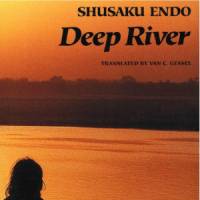In "Deep River" a group of elderly Japanese tourists and a couple join a tour of holy Buddhist sites in India. Motivated by different forms of grief and guilt, each is searching for healing. The narrative involves four main characters: Isobe, recently widowed, Kiguchi, a war veteran haunted by memories of Burma, Numada, a writer recovering from a serious illness, and Mitsuko, a cynical nurse searching for a heretical priest she knew in her youth.
Deep River, by Shusaku Endo, Translated by Van C. Gessel.
New Directions, Fiction.
The novel is a Dostoevskian study of the acceptance and forgiveness of sins, handled with a Graham Greene insouciance. Through religious devotion, ritual cleansing or submission to punishment, each character's spiritual crisis is played out against a backdrop of culture clashes and group tensions. As with all of Endo's books, it is deeply spiritual and unashamedly Christian, though he stops short of suggesting that Christianity may be a salve to the existential malaise he sees at the heart of modern Japanese life.
For a book that deals with such lofty ideas, Endo's subtle touch and jagged humor make the journey easy going. The young Japanese couple's whining about the dirtiness and poor service in India — a playfully used stereotype — provides welcome comic relief.
This short novel is both deep and fast-flowing, a moving examination of regret and acceptance, and a black comedy of manners encapsulating the shifting sands and strata of modern Japanese society.
Read archived reviews of Japanese classics at jtimes.jp/essential.

















With your current subscription plan you can comment on stories. However, before writing your first comment, please create a display name in the Profile section of your subscriber account page.